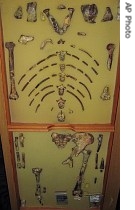2007年VOA标准英语-Fossil Lucy Leaves on Controversial US Tour(在线收听)
Nairobi
08 August 2007
One of the world's oldest hominid fossils, which revolutionized theories of early man, has left Ethiopia to begin a controversial tour of the United States. Anthropologists want the remains of the fossil, known as Lucy, returned home immediately, because they say she is too fragile and too valuable to travel. Caroline Sawyer reports for VOA from Kenya.
 |
| The framed hominid fossil 'Lucy,' is seen at a exhibition at the Ethiopian Natural History Museum in the Ethiopian capital of Addis Ababa, 24 Oct. 2006 (file photo) |
The departure of Lucy was not announced to the public. Ethiopians, who have only seen the fossil twice, say they are shocked that it will now be on public display.
Ethiopia's natural history museum in Addis Ababa only displays a replica of the fossil. The partial skeleton is so delicate that it was being kept in a vault.
Ethiopian authorities say the tour is aimed at raising money to improve their museums and build new ones. Richard Leakey, visiting professor of anthropology at Stony Brook University in New York, a renowned scientist and son of the famous paleontologists Louis and Mary Leakey, says the risk of damaging this unique fossil is far too high.
"Many of us feel that original fossils should not be moved from country to country," he said. "This is part of the Ethiopian responsibility to the world and in my judgment the Ethiopian government, particularly under Prime Minister Melles Zenowi, who is a man I respect, has totally abdicated its responsibility in this critical area of human understanding of our past."
In Addis Ababa, spokesman for the Ministry of Foreign Affairs, Teferri Meles disagrees.
"The experts believe there will not be any damage on the way, and proper care is being taken to transport it to America," he said. "The Ministry of Tourism and Culture has seen all the proper precautions in this regard."
To paleo-anthropologists, Lucy is one of the most exciting finds in the search for man's evolutionary development from ape to human. Scientists believe she stood upright and walked on two legs.
But since her discovery in northern Ethiopia in 1974, there are still questions as to whether she marks the massive leap away from ape-like behavior by preferring to walk on land, rather than moving through trees.
At the Houston Museum of Natural Science in Texas, where Lucy will be displayed for several months, the curator says his staff is experienced in looking after fragile artifacts. In 2004, the museum exhibited the Dead Sea Scrolls, which date to biblical times, without causing damage to the parchments.
Leakey says he fears that Lucy's tour may have far-reaching negative consequences for the scientific community.
"I am really concerned that Lucy is traveling now and this will not only possibly endanger the specimen, but will establish a precedent that we can ill afford," he added. "And I really, sincerely hope that museums around the world will take their role of public education seriously and will band together and make sure that this is never repeated with other fossils, and that Lucy is brought back to Ethiopia where she belongs as soon as possible."
Some museum directors in the United States who are interested in exhibiting Lucy have yet to sign contracts with Ethiopian authorities. They say they are still considering the additional work needed to house the fossil, and they remain concerned about the ethical issues of putting this one-of-a-kind artifact on display.